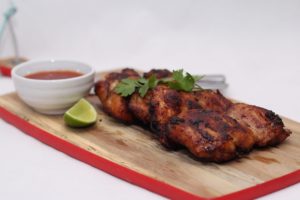On a low-carb diet and need meal prep? Sticking to a low-carb way of eating can be challenging. Any way of eating that alters from the conventional American diet–and the availability of junk food–can be a challenge.
Knowing what to eat, how much to eat, calories. There’s a lot to consider.
How often do you find yourself unprepared to go about the day eating right? You haven’t prepared anything the night before. Or a few days before.
What happens then? I know the answer to this–I’ve been here a million times.
You probably do what I do. You probably go out and get something from a nearby fast-food restaurant. Or you go to a store.
You’ll straighten yourself out tomorrow, you tell yourself. You’ll go home tonight and prepare a delicious meal. Right?
What’s lacking is discipline. What’s really lacking is planning, which requires discipline. Actually doing requires even more discipline.
Have you considered meal prep?

Meal prep is a bit of a time investment. But it can be highly beneficial to maintaining a certain way of eating.
The first step to meal prep
What are you going to have to eat?

That has to be your first step. Come up with a grocery list.
Breakfast (if you eat it), lunch, and dinner.
Go through the sale-ads at your local supermarket and look for items on sale. Don’t go to the store without a list. Otherwise, you’ll have a rough time of it. Going through the aisles wishy-washy on what to get while hordes of other shoppers hover over you is no fun.
Don’t go to the store hungry. We’ve all heard that one before. It’s true though. You’ll want to stay away from the impulse items at the register, which will only help to derail your progress.
What I like to do is have a list ready the night before I go to the grocery store, then hit the store in the morning when there’s less of a crowd.
Get in, get out.
What should I get?
I would divide meal items into three different categories: Meats, other animal products (OAPs), vegetables.
Items such as milk, coffee, toiletries, and other everyday products are a fourth category all on its own. Don’t worry about that too much at this point. We’re talking about meal planning, so we’ll stick to the big original three: meats, OAPs, vegetables.
For breakfast, concentrate on either meat and/or an OAP.
For lunch, concentrate on any combination of the big three below. Ditto for dinner.
One meat as your base item, one side OAP, and one veggie.
Meats
Pork shoulder
This is a cheap and versatile cut of meat. One of my favorites. I go over two great ways to make it along with tips on what to get.
Chicken thighs

Like with the pork shoulder, chicken thighs are inexpensive and relative fatty cuts of meat. You want fat because fat is flavor. In my opinion, the thigh is the most flavorful part of the chicken.
Tuna fish
Get the light tuna in water. The light tuna has the least mercury.
Avoid tuna in oil, as tuna is almost always drenched in unhealthy seed oils.
Make your own mayonnaise for a tuna salad. The drawback with tuna salad is it has a short shelf life. This is something you’ll want to make every 2-3 days at a time. Don’t make tuna salad on a Sunday night, expecting to eat it next Friday.
Bacon
You can cook it ahead of time, put it in the fridge. It cooks well in the microwave. Put a little water on the strips, wrap them in a paper towel, cook in 15-to-20-second intervals until done. I suggest short cooking intervals because it overcooks easily due to its thinness.
What I don’t suggest ahead of time
Steak. I’ve never had good luck reheating steak past one day, maybe two days. Unless you want to grill steak every other day for meal planning, I’d suggest cooking a steak fresh and eating it right then and there.
OAPs
Hard-boiled eggs

These are a favorite of mine. Most supermarkets will sell them pre-shelled in bags of 6 or 12. However, there are considerable cost-savings by buying brown eggs at the store and boiling them yourself. For brown eggs, if there is a free-range option on sale, get whatever’s on sale.
String cheese
This is easy to find at the store and come in packs of 8 to 12 sticks, sometimes even more. Grab two sticks out of the fridge on the way out the door if you’re taking them for lunch. I’d only recommend these if your body’s not intolerant to dairy–many people are intolerant to dairy. Watch out for “low fat” options, and avoid them as you sacrifice taste for no real health advantage.
Pepperoni
This is also a meat, but to me, this is more of a snack or a side item. A 6-ounce bag is anywhere from $2.00 to $5.00 per bag. Walmart and some of the big-box discount warehouses have them in much larger bags. I bought a 6-oz bag yesterday for $1.95 at Dollar General Market.
Pork rinds
I personally don’t eat pork rinds, but they’re an easy-to-find and inexpensive low-carb and animal-based choice. Pork rinds have the added bonus of longer shelf life.
Addendum: If you’re into clean eating and concerned about foreign ingredients, be sure to read the ingredients on any bag of pork rinds you buy. Make sure they contain only pork and salt. Also, you can make your own and substitute olive oil spray for actual extra virgin olive oil.
Beef jerky
This is a good one, but you’ll need to keep a close eye on the carbs. Lots of jerky, especially the mass-produced supermarket stuff contains a lot of sugar and other preservatives that drive up the carb count. There are low-carb jerky options out there, such as this one.
You can also make your own, using George Bruno’s technique of making biltong. And just what is the difference between biltong and beef jerky? Find out here.
Vegetables
Veggies–the cruciferous kind–are a good side meal that I like to have sometimes with lunch, but usually with dinner. These can all be prepped ahead of time and can be part of a meal later on down the road.
Broccoli
This may be my favorite of the cruciferous veggies. Easy to find, easy to cook, comes in a variety of preparations.
Also, broccoli is often readily available in restaurants as a substitute for french fries. One of my favorite restaurant meals is Chili’s 6-oz Sirloin with a double side of broccoli.
Asparagus

Like broccoli, asparagus can be cooked in a number of ways. Personally, I’m a big fan of grilling it while throwing various meats on the fire.
Salad
There’s any number of lettuce-based salad recipes out there. Toppings can include meats, cheeses, other veggies, even nuts. For the dressing, I use balsamic vinegar and olive oil. You can even use just the vinegar.
Don’t put the dressings on ahead of time. Put them on when you’re ready to eat the salad, or else you’re in for soggy and wilted lettuce.
Spinach
A superfood loaded with plenty of vitamins and minerals. You can also use spinach as the base of the aforementioned salad. It can also be steamed or sauteed with garlic and olive oil.
Turnip/mustard greens/swiss chard
Any combination of these greens can be cooked in huge batches and eaten over several days. Save some of that bacon grease and dump it in when you’re done cooking them. I like balsamic vinegar with my greens.
Brussels sprouts
Chances are you may not like them, but I love them. Always have. My favorite way to prepare them is to steam them with a steamer, then top them with simple butter, salt, and pepper. Montreal steak seasoning is a terrific topper as well.
Containers
You can get all sorts of different containers.
I like these glass divided containers. They come with three food slots: the big one for meat, and the smaller ones for OAPs and veggies. You can also get plastic ones, but I personally don’t trust any of those in the microwave. You can get around that, though, by microwaving your food on a separate ceramic plate.
I’m interested…Where do I start?
Start out by getting your food containers.
Make your grocery list, get enough breakfast, lunch, and dinner foods for 5-7 days.
For your meat, cook it ahead of time. Cook for 5-7 days.
Have enough food ready to fill up 5-7 of your containers at least for lunch. If you want to do one for dinner as well, that’s up to you, although that can be hard if you have a family and you want to eat together.
An example meal would be to get a 5-pound pork shoulder, pack away roughly one pound for each of the five days, a side of veggies for each of the five days, and maybe two hard-boiled eggs for each of the five days.
Just remember–one of each of the three categories for every meal you are planning for.
This post may contain affiliate links. See Animalbasedlife.com’s Affiliates Disclosure here.

Leave a Reply